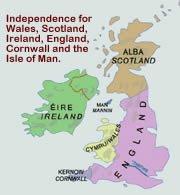The Stonemason has blogged about the eagerness of the Adam Smith Institute to see Glas Cymru (which owns Welsh Water) subjected to the “disciplines of private sector ownership”.
While it’s no surprise that they are calling for a successful publicly-owned company to be used as a cash-cow for shareholders, I feel I must unpick this particular assumption.
The issue of “discipline” relates to the principle-agent problem. How can those running a company be held accountable to its owners?
The Adam Smith Institute may argue that privatisation has been a wonder – but this is only true for shareholders. And some of these shareholders are ordinary people who are facing huge bills because of prices that go up when costs go up and stay up even when costs go down – yet they cannot as shareholders demand this of the company.
Because Glas Cymru is a company limited by guarantee its purpose is not to maximise the dividend paid to shareholders but to meet its objectives of providing high quality water and sewerage services to customers. This year each customer of Glas Cymru will recieve a dividend of £21.
Now, I’m not saying that it has the most socially-just model of ownership.
The company’s workforce – and the employees of contractors – should be regarded as stakeholders just as much as consumers. The objective of high-quality service cannot be met if workers are disempowered; good wages, working hours, and democratic representation ensure that high standards are maintained.
The remit should also include efficient use of energy and minimising any negative effects on the environment or natural wildlife.
Though Glas Cymru may not be perfect, it looks a damn sight better than what we have in England! We are being told that the only way to lower our bills is to have the profiteering water companies competing with each other. We have this with our gas and electricity suppliers – but do our bills come down? No, they compete with each other to squeeze as much money out of customers!
Privatisation has been a disaster. Public assets sold off at knock-down prices to the friends and sponsors of the governing party (Tories, now New Labour). Prices have been allowed to skyrocket -natural monopolies are milked for profit by colluding suppliers in gas, electricity, and railways. Rather than seeing greater private investment in our railways, more public money is invested in rail than ever before!
The likes of the Adam Smith Institute can try all they like to convince the public of the benefits of handing public resources over to big businesses. Their nonesense is only heeded by those politicians hoping to get cushy non-jobs in business after they leave office.
We need to return the privatised utilities to public ownership and democratic control, with the involvement of workers and consumers in the process of management.
Surveys of public opinion have never found a clear majority in favour of privatisation – and with the credit crunch being perceived as resulting deregulation and demutualisation, more and more people will begin to see the necessity of reversing the neoliberal era.
Privatisation of water and sewage services did not take place in Scotland or Northern Ireland. Scottish Water is owned by the Scottish government and both the incumbent nationalist party and the opposition Labour Party are committed to the company remaining in the public sector. The Scottish Tories are for privatisation, but are at pains to point out they don’t want what has happened in England! Northern Ireland Water priovides water and sewage services in the six counties; like Scottish Water it is still part of the public sector.
So, there’s Northern Ireland Water, Scottish Water, Welsh Water – how about English Water?
































































